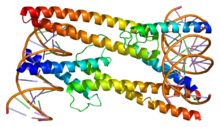- MXD1
-
Proteína 1 de dimerización MAX 
Estructura tridimensional de la proteína MXD1.HUGO 6761 Símbolo MXD1 Símbolos alt. MAD; MAD1; MGC104659 Datos genéticos Locus Cr. 2 p14 Bases de datos Entrez 4084 OMIM 600021 PDB 1nlw RefSeq NP_002348 UniProt Q05195 La proteína 1 de dimerización MAX (MXD1) es una proteína codificada en humanos por el gen MXD1.[1] [2]
La proteína MXD1 pertenece a la familia de proteínas de interacción MAX. Esta proteína compite con Myc para unirse a la proteína MAX y formar un complejo de unión a ADN específico de secuencia, que actúa como un represor transcripcional (mientras que Myc se une y actúa como activador) y es candidato a ser un supresor tumoral.[2]
Interacciones
La proteína MXD1 ha demostrado ser capaz de interaccionar con:
Referencias
- ↑ Shapiro DN, Valentine V, Eagle L, Yin X, Morris SW, Prochownik EV (Feb 1995). «Assignment of the human MAD and MXI1 genes to chromosomes 2p12-p13 and 10q24-q25». Genomics 23 (1): pp. 282–5. doi:. PMID 7829091.
- ↑ a b «Entrez Gene: MXD1 MAX dimerization protein 1».
- ↑ Laherty, C D; Yang W M, Sun J M, Davie J R, Seto E, Eisenman R N (May. 1997). «Histone deacetylases associated with the mSin3 corepressor mediate mad transcriptional repression». Cell (UNITED STATES) 89 (3): pp. 349–56. ISSN 0092-8674. PMID 9150134.
- ↑ Spronk, C A; Tessari M, Kaan A M, Jansen J F, Vermeulen M, Stunnenberg H G, Vuister G W (Dec. 2000). «The Mad1-Sin3B interaction involves a novel helical fold». Nat. Struct. Biol. (UNITED STATES) 7 (12): pp. 1100–4. doi:. ISSN 1072-8368. PMID 11101889.
- ↑ a b Gupta, K; Anand G, Yin X, Grove L, Prochownik E V (Mar. 1998). «Mmip1: a novel leucine zipper protein that reverses the suppressive effects of Mad family members on c-myc». Oncogene (ENGLAND) 16 (9): pp. 1149–59. doi:. ISSN 0950-9232. PMID 9528857.
- ↑ Cairo, S; Merla G, Urbinati F, Ballabio A, Reymond A (Mar. 2001). «WBSCR14, a gene mapping to the Williams--Beuren syndrome deleted region, is a new member of the Mlx transcription factor network». Hum. Mol. Genet. (England) 10 (6): pp. 617–27. ISSN 0964-6906. PMID 11230181.
- ↑ Meroni, G; Cairo S, Merla G, Messali S, Brent R, Ballabio A, Reymond A (Jul. 2000). «Mlx, a new Max-like bHLHZip family member: the center stage of a novel transcription factors regulatory pathway?». Oncogene (ENGLAND) 19 (29): pp. 3266–77. doi:. ISSN 0950-9232. PMID 10918583.
- ↑ Swanson, Kurt A; Knoepfler Paul S, Huang Kai, Kang Richard S, Cowley Shaun M, Laherty Carol D, Eisenman Robert N, Radhakrishnan Ishwar (Aug. 2004). «HBP1 and Mad1 repressors bind the Sin3 corepressor PAH2 domain with opposite helical orientations». Nat. Struct. Mol. Biol. (United States) 11 (8): pp. 738–46. doi:. ISSN 1545-9993. PMID 15235594.
- ↑ Brubaker, K; Cowley S M, Huang K, Loo L, Yochum G S, Ayer D E, Eisenman R N, Radhakrishnan I (Nov. 2000). «Solution structure of the interacting domains of the Mad-Sin3 complex: implications for recruitment of a chromatin-modifying complex». Cell (UNITED STATES) 103 (4): pp. 655–65. ISSN 0092-8674. PMID 11106735.
- ↑ Ayer, D E; Lawrence Q A, Eisenman R N (Mar. 1995). «Mad-Max transcriptional repression is mediated by ternary complex formation with mammalian homologs of yeast repressor Sin3». Cell (UNITED STATES) 80 (5): pp. 767–76. ISSN 0092-8674. PMID 7889570.
- ↑ Lee, Clement M; Onésime Djamila, Reddy C Damodara, Dhanasekaran N, Reddy E Premkumar (Oct. 2002). «JLP: A scaffolding protein that tethers JNK/p38MAPK signaling modules and transcription factors». Proc. Natl. Acad. Sci. U.S.A. (United States) 99 (22): pp. 14189–94. doi:. ISSN 0027-8424. PMID 12391307.
- ↑ Ayer, D E; Kretzner L, Eisenman R N (Jan. 1993). «Mad: a heterodimeric partner for Max that antagonizes Myc transcriptional activity». Cell (UNITED STATES) 72 (2): pp. 211–22. ISSN 0092-8674. PMID 8425218.
- ↑ Nair, Satish K; Burley Stephen K (Jan. 2003). «X-ray structures of Myc-Max and Mad-Max recognizing DNA. Molecular bases of regulation by proto-oncogenic transcription factors». Cell (United States) 112 (2): pp. 193–205. ISSN 0092-8674. PMID 12553908.
Categorías:- Genes del cromosoma 2
- Proteínas humanas
- Factores de transcripción
Wikimedia foundation. 2010.
